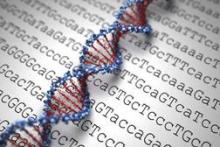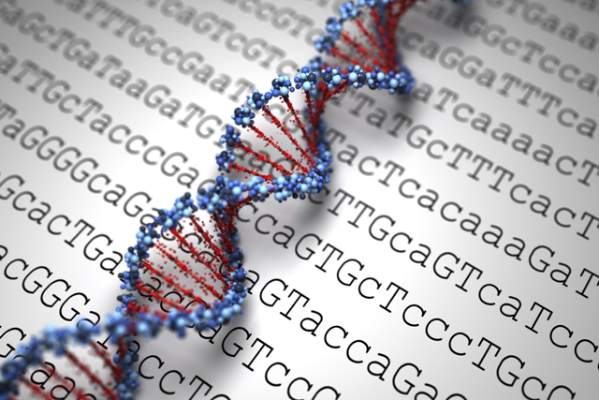User login
Single-nucleotide polymorphisms (SNPs) in the SLCOB1 gene were significantly associated with either gene expression levels or efficiency of dehydroepiandrosterone sulfate transport, which may influence outcomes of androgen deprivation therapy (ADT) in patients with prostate cancer, according to researchers.
The exonic rs12422149 SNP (AA/AG) was associated with a longer median time to progression (TTP) of 27.2 months (95% CI, 18.9-48.9), compared with 20.0 months (95% CI, 16.5-23.0) for the major GG genotype (P = .019). The intronic rs1077858 SNP was associated with a shorter median overall survival (OS) of 5.2 years (95% CI, 4.3-6.8) for the AA/AG variant, compared with 6.7 years (95% CI, 6.2-7.2) for the GG genotype (J Clin Oncol. 2015 Dec 14. doi: 10.1200/JCO.2015.62.5988).
The SLCO2B1 gene mediates cellular uptake of endogenous sex steroid conjugates, such as DHEAS (dehydroepiandrosterone sulfate), and is highly expressed in castration-resistant prostate cancer tumors, compared with localized prostate cancer primary tumors. A previous study identified three SLCO2B1 SNPs that significantly influenced TTP in patients receiving androgen-deprivation therapy, but the current findings validated only the exonic rs12422149 SNP as having a significant association with TTP.
The intronic rs1077858 SNP correlated with differences in TTP in the initial cohort, but the current study did not find a significant association between rs1077858 and TTP in the validation cohort. The intronic SNP was significantly associated with OS in the combined cohort.
“As such, it is plausible that the rs1077858 GG variant, with its greater SLCO2B1 expression level, results in enhanced DHEAS uptake and increased activation of the AR signaling pathway, with subsequent decreased OS in patients. It is unclear why we observed an OS benefit with no definite impact on TTP with rs1077858 in the validation cohort,” wrote Dr. Xiaodong Wang of the Dana-Farber Cancer Institute, Boston, and colleagues.
The initial and validation cohorts consisted of 478 and 616 patients, respectively, with biochemical recurrence (M0) or radiologically evident metastatic disease (M1) who had received ADT for hormone-sensitive prostate cancer.
The exonic rs12422149 SNP, associated with TTP in both initial and validation cohorts, was not significantly associated with OS in the combined cohort. The investigators proposed a mechanistic explanation that DHEAS uptake may be an important driver in earlier stages of metastatic disease, but later stages might be driven by nonandrogen pathways.
Additional confounders include therapeutic heterogeneity among patients, as well as differences in patient and disease characteristics between the initial and validation cohorts.
Dr. Wang reported having no relevant financial disclosures. Dr. Harshman and Dr. Kantoff reported ties to industry.
Single-nucleotide polymorphisms (SNPs) in the SLCOB1 gene were significantly associated with either gene expression levels or efficiency of dehydroepiandrosterone sulfate transport, which may influence outcomes of androgen deprivation therapy (ADT) in patients with prostate cancer, according to researchers.
The exonic rs12422149 SNP (AA/AG) was associated with a longer median time to progression (TTP) of 27.2 months (95% CI, 18.9-48.9), compared with 20.0 months (95% CI, 16.5-23.0) for the major GG genotype (P = .019). The intronic rs1077858 SNP was associated with a shorter median overall survival (OS) of 5.2 years (95% CI, 4.3-6.8) for the AA/AG variant, compared with 6.7 years (95% CI, 6.2-7.2) for the GG genotype (J Clin Oncol. 2015 Dec 14. doi: 10.1200/JCO.2015.62.5988).
The SLCO2B1 gene mediates cellular uptake of endogenous sex steroid conjugates, such as DHEAS (dehydroepiandrosterone sulfate), and is highly expressed in castration-resistant prostate cancer tumors, compared with localized prostate cancer primary tumors. A previous study identified three SLCO2B1 SNPs that significantly influenced TTP in patients receiving androgen-deprivation therapy, but the current findings validated only the exonic rs12422149 SNP as having a significant association with TTP.
The intronic rs1077858 SNP correlated with differences in TTP in the initial cohort, but the current study did not find a significant association between rs1077858 and TTP in the validation cohort. The intronic SNP was significantly associated with OS in the combined cohort.
“As such, it is plausible that the rs1077858 GG variant, with its greater SLCO2B1 expression level, results in enhanced DHEAS uptake and increased activation of the AR signaling pathway, with subsequent decreased OS in patients. It is unclear why we observed an OS benefit with no definite impact on TTP with rs1077858 in the validation cohort,” wrote Dr. Xiaodong Wang of the Dana-Farber Cancer Institute, Boston, and colleagues.
The initial and validation cohorts consisted of 478 and 616 patients, respectively, with biochemical recurrence (M0) or radiologically evident metastatic disease (M1) who had received ADT for hormone-sensitive prostate cancer.
The exonic rs12422149 SNP, associated with TTP in both initial and validation cohorts, was not significantly associated with OS in the combined cohort. The investigators proposed a mechanistic explanation that DHEAS uptake may be an important driver in earlier stages of metastatic disease, but later stages might be driven by nonandrogen pathways.
Additional confounders include therapeutic heterogeneity among patients, as well as differences in patient and disease characteristics between the initial and validation cohorts.
Dr. Wang reported having no relevant financial disclosures. Dr. Harshman and Dr. Kantoff reported ties to industry.
Single-nucleotide polymorphisms (SNPs) in the SLCOB1 gene were significantly associated with either gene expression levels or efficiency of dehydroepiandrosterone sulfate transport, which may influence outcomes of androgen deprivation therapy (ADT) in patients with prostate cancer, according to researchers.
The exonic rs12422149 SNP (AA/AG) was associated with a longer median time to progression (TTP) of 27.2 months (95% CI, 18.9-48.9), compared with 20.0 months (95% CI, 16.5-23.0) for the major GG genotype (P = .019). The intronic rs1077858 SNP was associated with a shorter median overall survival (OS) of 5.2 years (95% CI, 4.3-6.8) for the AA/AG variant, compared with 6.7 years (95% CI, 6.2-7.2) for the GG genotype (J Clin Oncol. 2015 Dec 14. doi: 10.1200/JCO.2015.62.5988).
The SLCO2B1 gene mediates cellular uptake of endogenous sex steroid conjugates, such as DHEAS (dehydroepiandrosterone sulfate), and is highly expressed in castration-resistant prostate cancer tumors, compared with localized prostate cancer primary tumors. A previous study identified three SLCO2B1 SNPs that significantly influenced TTP in patients receiving androgen-deprivation therapy, but the current findings validated only the exonic rs12422149 SNP as having a significant association with TTP.
The intronic rs1077858 SNP correlated with differences in TTP in the initial cohort, but the current study did not find a significant association between rs1077858 and TTP in the validation cohort. The intronic SNP was significantly associated with OS in the combined cohort.
“As such, it is plausible that the rs1077858 GG variant, with its greater SLCO2B1 expression level, results in enhanced DHEAS uptake and increased activation of the AR signaling pathway, with subsequent decreased OS in patients. It is unclear why we observed an OS benefit with no definite impact on TTP with rs1077858 in the validation cohort,” wrote Dr. Xiaodong Wang of the Dana-Farber Cancer Institute, Boston, and colleagues.
The initial and validation cohorts consisted of 478 and 616 patients, respectively, with biochemical recurrence (M0) or radiologically evident metastatic disease (M1) who had received ADT for hormone-sensitive prostate cancer.
The exonic rs12422149 SNP, associated with TTP in both initial and validation cohorts, was not significantly associated with OS in the combined cohort. The investigators proposed a mechanistic explanation that DHEAS uptake may be an important driver in earlier stages of metastatic disease, but later stages might be driven by nonandrogen pathways.
Additional confounders include therapeutic heterogeneity among patients, as well as differences in patient and disease characteristics between the initial and validation cohorts.
Dr. Wang reported having no relevant financial disclosures. Dr. Harshman and Dr. Kantoff reported ties to industry.
FROM JOURNAL OF CLINICAL ONCOLOGY
Key clinical point: Single-nucleotide polymorphisms rs12422149 and rs1077858 in the SLCO2B1 gene were associated with time to progression and overall survival, respectively, in prostate cancer patients receiving androgen deprivation therapy.
Major finding: For patients harboring the SNP rs12422149 AA/AG, median time to progression was 27.2 months, compared with 20.0 months for the GG variant; for SNP rs1077858, median overall survival was 5.2 years for the AA/AG variant, compared with 6.7 years for the GG variant.
Data source: Initial and validation cohorts of 478 and 616 patients, respectively, with biochemical recurrence or radiologically evident metastatic disease who had received ADT for hormone-sensitive prostate cancer.
Disclosures: Dr. Wang reported having no relevant financial disclosures. Dr. Harshman and Dr. Kantoff reported ties to industry.

